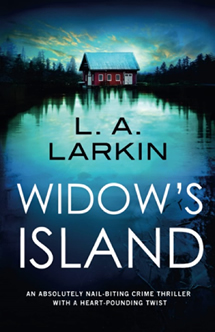Reviewed by Robert Goodman.
By LA Larkin, Bookouture.
 After spending time with international trouble shooter Olivia Wolfe (Devour and Prey), Australian thriller writer LA Larkin returns with a slightly more grounded, but no less feisty when push comes to shove, main character in Widow’s Island. But thematically, Larkin stays on familiar ground anchoring the action around themes of climate change and the power of technology.
After spending time with international trouble shooter Olivia Wolfe (Devour and Prey), Australian thriller writer LA Larkin returns with a slightly more grounded, but no less feisty when push comes to shove, main character in Widow’s Island. But thematically, Larkin stays on familiar ground anchoring the action around themes of climate change and the power of technology.
After a creepy cold open the narrative moves to Stephanie Miller, the lead researcher on a proposal to develop an American military commission to respond to the threat of climate change. Stephanie is slated to testify about her research before a powerful Senate committee. But life is tough for Stephanie – she is dealing with the recent death of her soldier husband Patrick and has decided to relocate with her 15 year old daughter Amy to a small community called Whisper Island in Washington State to be closer to her best friend and further from her painful memories. And then the cyberbullying begins. Rumours and innuendo start to spread through social media specifically designed to discredit her and her work and destroy her life. It emerges quickly that the campaign is being run out of a professional “troll farm” in Seattle. And just when Stephanie thinks she is getting that issue under control her best friend Jen is killed, her death reminiscent of a series of killings from ten years before, bringing her to the attention of the FBI.
There is a lot going on in Widow’s Island. Political machinations, cyber attacks, gaslighting, the Dark Web, climate change, tensions between Stephanie and Amy, schoolyard bullying, and on top of all of that a potential serial killer on the loose. And while Larkin manages to both keep all of this in the air, the whole endeavour sometimes feels a little overstuffed.
What works best, and generates the most amount of real tension in Widow’s Island is the exploration of the way that social media can be weaponised to destroy lives. Larkin is not afraid to link her premise to the Russian troll farms that influenced the 2016 US election and the Brexit vote, with the idea that “if it worked for them it will work for us”. But she also draws out the real world similarities that the FBI is seeing between psychopathy of on-line predators and that of killers. In an afterword Larkin says the germ of the idea for this book came from a trending hashtag on twitter relating to abusing women. The way in which social media can so easily be abused is frightening. Larkin goes further to look at the path by which these confected stories can be picked up by “mainstream” media not only amplifying the lies but also devaluing the credibility of the whole of the media landscape.
Widow’s Island is at its heart a thriller and it is for the most part an effective one. Stephanie and her responses to the threats against her is a believable and appealing protagonist who holds the narrative together. Larkin slowly turns the screws on Stephanie both psychologically and physically while lining up potential suspects and building up a cast of supporters working on the sidelines. The twists, while not unexpected, land well and while the killer feels like he has come out of central casting, Larkin does more than enough to drive the sort of cathartic, page-turning survival-horror finale that these type of thrillers require.
This and over 600 more reviews can be found on Pile by The Bed.











